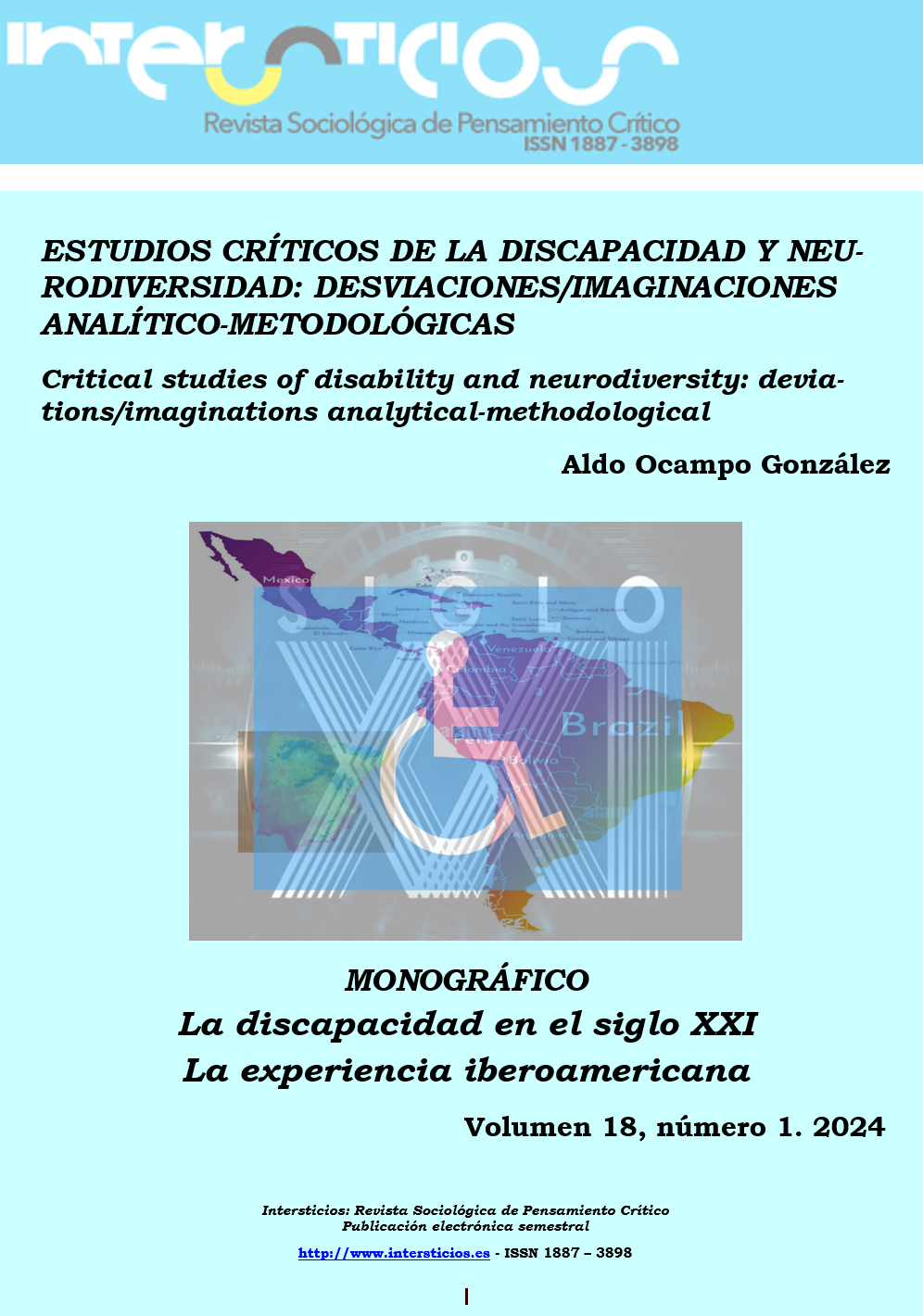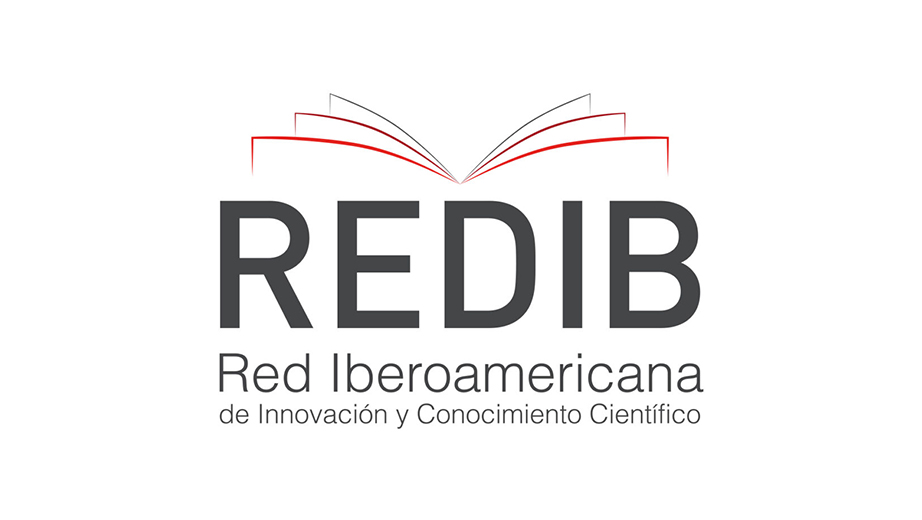Critical studies of disability and neurodiversity: deviations/imaginations analytical-methodological
Keywords:
epistemology; critical disability studies; methodological deficit; neurodiversity; political action.Abstract
In this work I explore some of the main attributes that allow disability studies to be studied academically in terms of a false problem. What interests critical disability studies is how to inhabit diverse methods in order to undo the normative domains of knowledge to which they lead us. The method used to construct this essay has been that of critical documentary review. The work concludes that one of the most significant warnings that explanatory models of disability lead us to is their philosophical, ideological and epistemic inability to offer a radical alternative to destabilize the disabling tendencies – still in use – typical of society. modern, which have been made invisible and/or discussed with little contextual relevance. The problem of critical disability studies is multiple. It requires, on the one hand, recognition of the marked methodological deficit that affects its research practices, as well as the circle of epistemological reproduction that nourishes and informs the thinking habits of its practitioners, who position their objects of analysis through biopolitical paradigm of rights.
References
Barnes, E. (2009). Disability, minority, and difference. Journal of Applied Philosophy, 26(4), 337–355.
Barnes, C. (2012). Disability Studies: what’s the point? Recuperado el 22 de febrero de 2024 de: https://disability-studies.leeds.ac.uk/wp-content/uploads/sites/40/library/Barnes-Whats-the-point.pdf
Barton, (2010). Discapacidad y sociedad. Madrid: Morata.
Bertilsdotter, H., Chown, N. & Stenning, A. (2020). Neurodiversity Studies. A New Critical Paradigm. London: Routledge.
Chapman, R. (2020). “Neurodiversity, disability, wellbeing”; en: Bertilsdotter, H., Chown, N. & Stenning, A. (Edts.). Neurodiversity Studies. A New Critical Paradigm. (pp.57-72). London: Routledge.
Ferguson, Ph. & Nusbaum, E. (2012). Disability Studies: What Is It and What Difference Does It Make? Research & Practice for Persons with Severe Disabilities, Vol. 37, No. 2, 70-80.
Garland-Thomson, R. (2012). The case for conserving disability. Bioethical Inquiry, 9, 339– 355.
Gilson, E. C. (2014). The Ethics of Vulnerability: A Feminist Analysis of Social Life and Practice. New York: Routledge.
Goodley, D. (2013). Dis/ability Studies: Theorising Disablism and Ableism. London: Routledge.
Goodley, D., Lawthom, R., Liddiard, K. & Runswick-Cole, K. (2019). Provocations for Critical Disability Studies. Disability & Society, 1-26. DOI: 10.1080/09687599.2019.1566889
Foucault, M. (1997). “Polemics, politics and problematizations: An interview with Michel Foucault”; en: Rabinow, P. (Ed.). Ethics: Subjectivity and Truth. (pp.111–133). New York: The New Press.
Flick, U. (1998). Introducción a la Investigación Cualitativa. Madrid: Morata.
Hill Collins, P. (2019). Intersectionality as Critical Social Theory. Nueva York, Estados Unidos: Duke University Press.
Jaarsma, A. S. (2017). Kierkegaard after the Genome: Science, Existence and Belief in This World. New York, NY: Palgrave Macmillan.
Jaarsma, A. S. (2020). Critical disability studies and the problem of method. Recuperado el 12 de noviembre de 2023 de: https://www.taylorfrancis.com/chapters/edit/10.4324/9780429199776-3/critical-disability-studies-problem-method-ada-jaarsma
Lazzarato, M. (2010). Multiplicity, Totality and Politics. Recuperado el 23 de febrero de 2024 de: https://www.parrhesiajournal.org/parrhesia09/parrhesia09_lazzarato.pdf
Mouffe, Ch. (2007). En torno a lo político. Buenos Aires: FCE.
Ocampo, A. (2021). Ontología de la educación inclusiva: devenires neo-materialistas. Revista Educação, 46(1), 1-22.
Ocampo, A. (2022). La educación inclusiva como dispositivo heurístico. Revista Chakiñan de Ciencias Sociales y Humanidades, núm. 16, 159-176.
Ocampo, A. (2023). Epistemología de la educación inclusiva o la pregunta por sus dilemas de definición. Escritos, 31(66), 144-61.
Price, M. (2011). Mad at School: Rhetorics of Mental Disability and Academic Life. Ann Arbor. MI: University of Michigan Press.
Soto, A. (2014). Jacques Rancière, desajustes metodológicos en el tratamiento de las imágenes. Aisthe, Vol. 7, nº 12, 35-51.
Soto, A. (2020a). La performatividad de las imágenes. Santiago: Metales Pesados.
Sharma, N. (2019). “Strategic Anti- Essentialism: Decolonizing Decolonization”; en: McKittrick, K. (Ed.). Sylvia Wynter: on being human as praxis. (pp.164-182). Durham: Duke University Press.
Shildrick, M. (2012). “Critical Disability Studies: Rethinking the Conventions for the Age of Postmodernity”; en: Watson, N., Roulstone, A. & Thomas, C. (Eds). Routledge Handbook of Disability Studies. (pp.30–41). London: Routledge.
Shildrick, M. (2009). Queering Performativity: Disability after Deleuze. SCAN: Journal of Media Arts Culture, 1 (3), 1–6.
Spivak, G. (1988). ¿Puede hablar el subalterno? Recuperado el 23 de octubre de 2023 de: https://www.redalyc.org/pdf/1050/105018181010.pdf
Wynter, S. (1991). Tras el hombre", su última palabra: sobre el posmodernismo, Les Damnes y el principio sociogénico. Recuperado el 01 de diciembre de 2023 de: https://monoskop.org/images/a/a6/Wynter_Sylvia_1991_Tras_el_Hombre_su_ultima_palabra.pdf
White, H. (1973). Metahistoria. La imaginación histórica en la Europa del siglo XIX. México: FCE.

Downloads
Published
Issue
Section
License
Copyright (c) 2024 Aldo Ocampo González

This work is licensed under a Creative Commons Attribution 4.0 International License.
p class="TEXTO-izquierda">Authors maintain the @copyright, giving to the journal the right of first editio.







